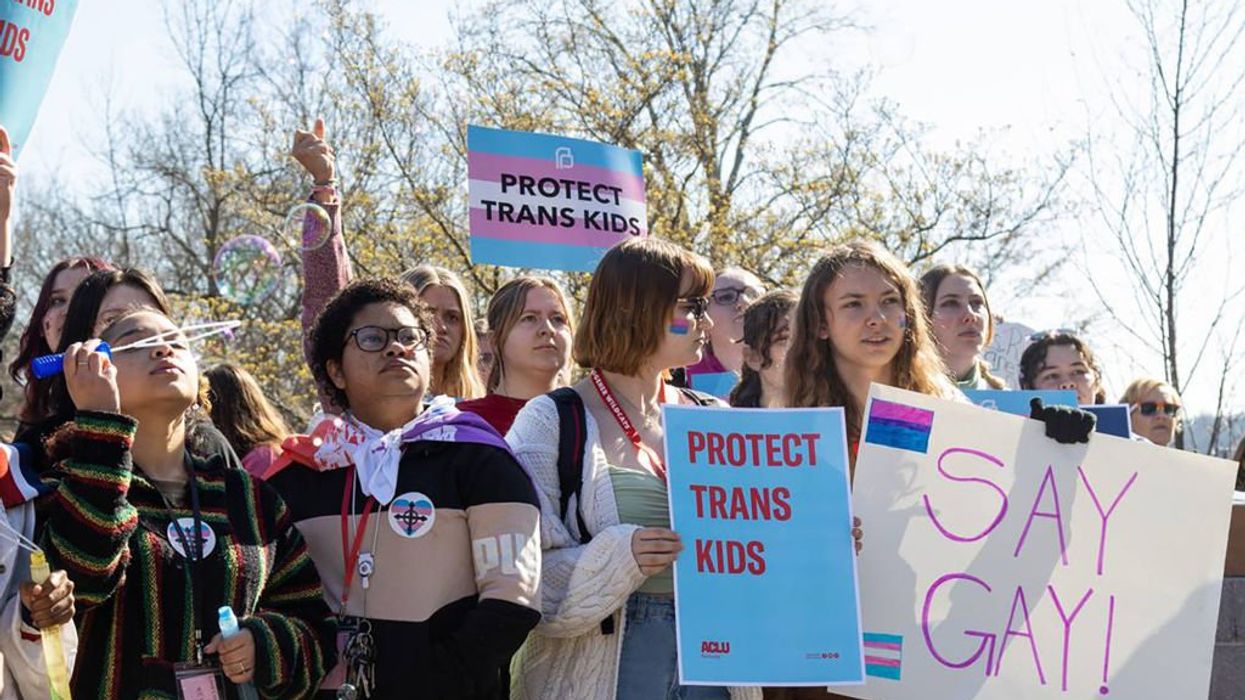
Marcus Dorsey/Lexington Herald-Leader/Tribune News Service via Getty Images

Dr. Kristopher Kaliebe on why the gender-dysphoric deserve better than "affirming care."
There was a time not so long ago when the birds and the bees had a pretty straightforward gig. We had males, we had females, and the most complicated thing about it was deciding who takes out the trash.
But unless you’ve been living under a cultural rock — or perhaps on a very distant planet — it's become abundantly clear that those days are behind us.
'The peer review in youth gender medicine is completely dysfunctional. There is a small group of ideologues who do the peer review and suppress the scholarly exchange.'
Now, gender and sex have become the social equivalent of advanced calculus, and everyone seems to be working with a different equation. In this brave new world, even the birds and bees are questioning their identities.
This is not just a passing trend but a profound societal shift. The discussion around gender, once grounded in biology and tradition, has morphed into an ideological battleground, and few have dared to question the prevailing narrative — except for those like Dr. Kristopher Kaliebe.
A distinguished psychiatrist and professor at the University of South Florida, Kaliebe has not shied away from challenging the status quo. As a board-certified expert in general, forensic, and child and adolescent psychiatry, he has a deep understanding of the complexities involved in treating non-conforming and gender-dysphoric youth. Yet what he sees in his field today alarms him.
Kaliebe argues that leading professional organizations like the American Academy of Pediatrics and the American Psychiatric Association have become mouthpieces for political agendas, sidelining rigorous scientific debate in favor of a predetermined narrative.
Kaliebe's critique is sharp and unflinching. He points out that these organizations have unilaterally endorsed medicalized and affirmative treatments for gender dysphoria in minors based on flimsy evidence, often derived from studies riddled with methodological flaws. Worse, this endorsement was made without the broad consent of their members or the benefit of a robust, open debate. According to Kaliebe, the result is a suppression of scholarly skepticism, where dissenting voices are marginalized and important questions go unasked.
This is not just a professional concern for Kaliebe; it’s a matter of intellectual integrity. He sees this as a symptom of what Jonathan Haidt describes as "structural stupidity" — a decline in intellectual rigor and an increase in groupthink, driven by ideological conformity rather than objective analysis. The medical community, once committed to evidence-based practices, is now, in Kaliebe’s view, at risk of becoming an echo chamber where only politically convenient truths are allowed to be heard.
Kaliebe speaks from experience.
“At the University of South Florida,” he says, “I have been consistently supported by my trainees, peers, and administration. I discuss these issues openly with students and all levels of trainees. We have a pleasant, rigorous, open dialogue. There is no problem.”
But this intellectual freedom is not universal. “Unfortunately, I hear from colleagues up North and out West that it is not the same at many other universities,” Kaliebe notes. In psychiatric professional organizations, he observes a sadder state of affairs: “These organizations have chosen to take on a role primarily as advocacy organizations and thus de-emphasized their role as scientific organizations.”
Kaliebe’s attempts to raise concerns have been met with resistance. He has submitted multiple letters and articles to the journal of the American Academy of Child and Adolescent Psychiatry, only to have them consistently declined.
“The peer review in youth gender medicine is completely dysfunctional,” he asserts. “There is a small group of ideologues who do the peer review and suppress the scholarly exchange.”
The implications of this ideological capture are profound, particularly when it comes to the treatment of adolescents experiencing gender dysphoria. Kaliebe emphasizes the need for a more nuanced, individualized approach.
First and foremost, he advocates for addressing comorbid conditions, such as depression, anxiety, PTSD, autism, ADHD, or personality disorders, which often accompany gender dysphoria. Treating these underlying issues, he argues, should be a priority before considering more radical interventions like social transitioning or hormone therapy.
Kaliebe is particularly cautious about social transitioning in minors, warning that it may prevent the natural resolution of gender dysphoria. He suggests that youth continue using their birth names and pronouns as they explore their identities, allowing for a more thoughtful and less pressured development process. Family therapy and education are also crucial, as clinicians have a responsibility to support families while avoiding the automatic encouragement of medical transitions.
Moreover, Kaliebe stresses the importance of physical and mental well-being in this context. Engaging in vigorous physical activity, practicing mind-body techniques like yoga and meditation, and fostering a sense of shared humanity beyond gender identity can all play significant roles in helping adolescents navigate this challenging period.
Finally, Kaliebe urges a re-evaluation of the slogans that often dominate the discourse around gender-affirming care. Many youths and their families, he warns, are unaware of the evidence challenging the safety and efficacy of medical transitions. Sexual orientation and trauma history, too, must be carefully considered, as they can be significant factors in the development of gender dysphoria.
In the end, Kaliebe’s message is clear: Psychotherapy should be the primary approach for addressing persistent gender dysphoria, ensuring that treatment plans are comprehensive, supportive, and grounded in rigorous science. His call for open, evidence-based debate within medical organizations is not just a plea for intellectual honesty but a necessary step to prevent harm and restore credibility to a field that, in his view, has lost its way.
John Mac Ghlionn
Contributor